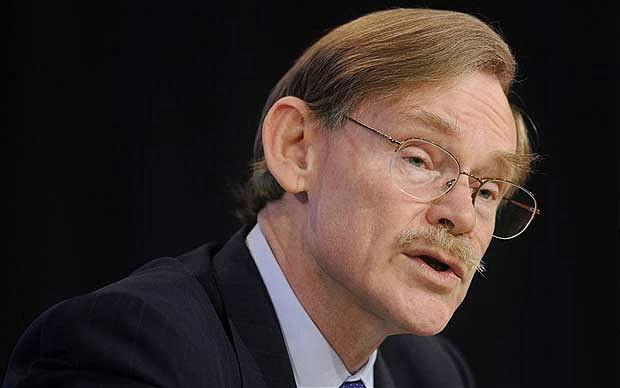
Peter Zeihan: Europe Goes Nuclear
We’ve got two major developments in Eurasia. We’re talking about Ukraine disabling two ships in the Caspian Sea and Poland getting EU approval to build…
Thought Leader: Peter Zeihan

(The Wall Street Journal) – One of America’s senior statesmen predicted earlier this year that Donald Trump’s hunger for success would push the president toward a more traditional foreign policy. I countered that it depends on how Mr. Trump defines success. We now have an answer: Mr. Trump’s foreign policy reflects his instinct for political realignment at home, based on celebrity populism.
Populist movements feed off grievances and impatience with traditional politics. Frustrations—whether generated by economic distress, social displacement, or cultural challenges—fuel skepticism about institutions and elites. Challengers (who want to become the new elite) attack traditional leaders as out of touch, incompetent and corrupt.
Mr. Trump rallies his supporters by proclaiming the three presumptions of populism. First, it professes to reflect the will of a scorned people. Hillary Clinton called them “deplorables.” The will of the people is intolerant of the give-and-take of pluralism and disdains the identity politics of the Democratic Party.
Second, populism finds and blames enemies, domestic or foreign, who thwart the people’s will. Mr. Trump has mastered insulting such scapegoats.
Third, populism needs “the leader,” who can identify with and embody the will of the people. Like other populist leaders, Mr. Trump attacks the allegedly illegitimate institutions that come between him and the people. His solutions, like those of other populists, are simple. He contends that the establishment uses complexity to obfuscate and cover up misdeeds and mistakes. He claims he will use his deal-making know-how to get results without asking the public to bear costs.
Mr. Trump’s foreign policies serve his political purposes, not the nation’s interests. He says the U.S. needs to build a wall to keep Mexicans at bay—and Mexico will pay for it. He asserted he would block Muslims from coming to America to harm us. His protectionist trade policies are supposed to stop foreigners from creating deficits, stealing jobs, and enriching the corporate elite. Mr. Trump also asserts that U.S. allies have been sponging off America. The U.S. military is supposed to hammer enemies and not bother with the cleanup—even if the result, for example in Syria, is an empowered axis of Iran, Shiite militias, Hezbollah and Bashar Assad’s regime.
The president’s emphasis on discontinuity—breaking things—demonstrates action while disparaging his predecessors. He pulled out of the Trans-Pacific Partnership, but the other 11 countries are proceeding without the U.S. He wants to destroy the North American Free Trade Agreement and strangle the U.S.-Korea Free Trade Agreement; he also is threatening the World Trade Organization’s rules and system for settling disputes. His style of deal-making prizes uncertainty and brinkmanship, which risks escalation, without a plan for what comes next.
Mr. Trump’s foreign policy represents a break from postwar presidents of both parties, reaching back to Harry S. Truman. Other presidents led an alliance system that recognizes U.S. security is connected to mutual interests in Europe, the Asia-Pacific region and the Middle East. Past presidents believed that the U.S. economy would prosper in a world of expanding capitalism, governed by adaptive rules and practices that matched America’s competitive and dynamic markets. Over time, U.S. foreign policy strove to expand human rights, liberty and democracy. Mr. Trump dismisses this U.S.-led international system as outdated, too costly and too restrictive of his case-by-case deal-making.
The 70-year-old U.S. foreign policy architecture has been grounded in institutions. But Mr. Trump disdains America’s intelligence agencies and is dismantling the State Department. His foils at home are the courts, the press, a clumsy Congress beholden to antiquated procedures, and even his own Justice Department.
Mr. Trump’s recent trip to Asia reveals that foreigners have taken his measure. They play to his narcissism. He in turn basks in their attention, diminishes his own country by blaming past presidents, and preens with promises of great but unspecified things to come. Other countries are preparing for a world in which they can expect U.S. demands but can no longer rely on American leadership.
The president’s need to project an image of personal power—for his domestic audience and his ego—makes him more comfortable with authoritarian leaders. Presidents Xi Jinping, Vladimir Putin and Rodrigo Duterte have noticed, as has part of the Saudi royal family. Democratic leaders, accountable to public opinion, face a more complex choice: They can keep their distance and risk Mr. Trump’s ire or try to manipulate him through frequent attention, royal treatment, golf and courtship of the family.
Yet Mr. Trump’s ride on the populist wave—and the foreign policy that matches his politics—faces a big obstacle: Most Americans do not agree with his approach. Significant majorities prefer the fundamentals of the foreign policies Mr. Trump is deconstructing, according to a 2017 survey of American adults from the Chicago Council on Global Affairs. Sixty percent say alliances with Europe and East Asia either are mutually beneficial or mostly benefit the U.S. Record numbers say international trade is good for consumers (78%), the economy (72%) and job creation (57%). Some 65% support providing illegal immigrants a path to citizenship, and only 37% characterize immigration as a critical threat. All these numbers have shifted against Mr. Trump’s positions since the election.
Elected Republicans face a moment of decision. Voters with a very favorable view of Mr. Trump are moving toward protectionism and against alliances and immigration. Mr. Trump’s Republican Party pits nationalism against America’s internationalism, whereas for 70 years GOP leaders saw them as two sides of a coin.
Democratic leaders face a challenge as well. Their voters, especially younger ones, increasingly support trade, according to Chicago Council data. Democrats will need to decide whether to compete with Mr. Trump’s isolationist economic nationalism or offer a new vision of American leadership.
Mr. Trump’s foreign policy represents a change of type, not simply degree. Previous populist impulses in the U.S. ran their course, creating opportunities for adaptation, not simply disruption. Patriotic Republican and Democratic leaders must challenge Mr. Trump’s foreign-policy destruction. Political defeat is not the same as ideological defeat. The debate over ideas is just beginning.
Mr. Zoellick is a former World Bank president, U.S. trade representative and deputy secretary of state.
Peter Zeihan: Europe Goes Nuclear
We’ve got two major developments in Eurasia. We’re talking about Ukraine disabling two ships in the Caspian Sea and Poland getting EU approval to build…
Thought Leader: Peter Zeihan
Dr. Sanjay Gupta’s Top Health Stories of 2025
From the resurgence of measles to a new way to treat pain, 2025 was a challenge for public health while still offering moments of hope. Sanjay…
Thought Leader: Sanjay Gupta
Ian Bremmer: The state of global conflict in 2025
On GZERO World, Ian Bremmer takes a hard look at the biggest global crises and conflicts that defined our world in 2025 with CNN’s Clarissa…
Thought Leader: Ian Bremmer

